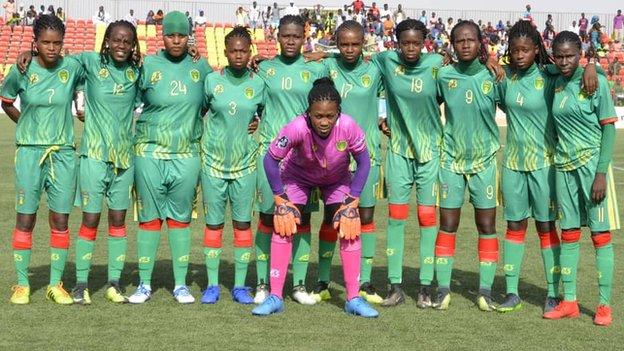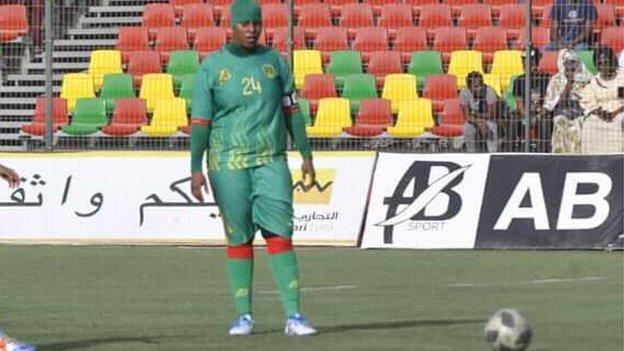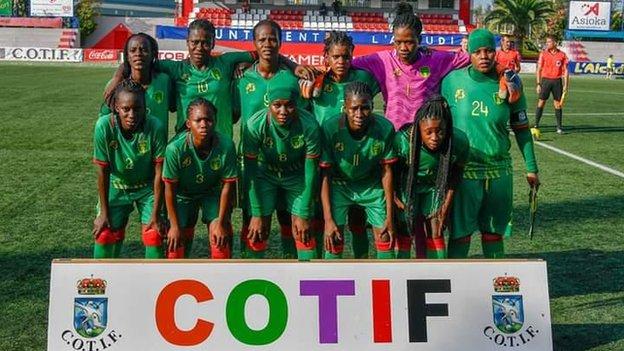Ending the idea that 'girls don't play football in Mauritania'
Last updated on .From the section African

'Girls don't play football in Mauritania' is the attitude that Slemha Sid'Ahmed and her team-mates are battling against as they establish the country's first national women's team.
A few years ago the idea of Mauritania fielding a women's national team was unthinkable: a deeply conservative society would not allow it and the funds were not there.
In the slipstream of Mauritania's participation in the 2019 men's Africa Cup of Nations things are now changing.
In July, while the men played at the highest level in Egypt, the women's team led by Sid'Ahmed hosted Djibouti in their first ever international.
Sid'Ahmed told BBC Sport that she had goosebumps as she led the team out at the Cheikha Ould Boïdiya Stadium, Nouakchott in front of her family and the fans in the stands.
"It was a big, big honour to play for your national team, but there was a lot of stress, and a lot of responsibility," the 28-year-old recalls.
Mauritania's debut did not go as planned as the hosts were defeated 3-1 by the Gazelles, another novice team in African women's football.
The captain's journey
It has not been an easy journey for Sid'Ahmed who began playing football with the boys in her neighbourhood aged six.
Her father, a driver, and her mother, a house keeper, disapproved of their daughter's favourite pastime: physical contact between girls and boys was socially unacceptable and family and friends were whispering about her behaviour.

"Girls didn't play football in Mauritania," she explained.
"My parents's reaction was negative. In Mauritania society doesn't like girls playing football.
"It was a big problem to play football in this kind of society. Playing with boys was the only way to practice."
Slowly, her parents were won over by their daughter's enduring passion for the game and at the age of eighteen Sid'Ahmed joined Nouakchott-based amateur club FC Camara, where she played and trained with 20 other girls.
FC Camara have won the Mauritanian championship thrice, but the conditions Sid'Ahmed and her teammates encounter remain perilous at a club that lacks the resources to properly support a women's team.
"The club doesn't have the ability to give the girls money or to pay them," she explained.
"Sometimes we have to buy our own equipment. The coach also tries to do his best.
"If a player can't buy her gear, we try to help buying them shoes and t-shirts. It is not like a normal club, because there is no money, but we try to deal with it."
The first steps
Competitive women's football was introduced in 2017 in Mauritania with the help of development money provided by the football's world governing body 'Fifa Forward.'
All 211 member associations were entitled to up to $1.25 million per year to develop their domestic football, including the women's game - a figure that has been more than quadrupled when Fifa revised the program at the start of 2019.
In the wake of Mauritania's maiden qualification for the men's Africa Cup of Nations and in a bid to secure Fifa's development funding, the Mauritania Football Federation (FFRIM) launched a national women's team in February.
The federation appointed Abdullah Diallo, a former international who had played his football in Cameroon in the 80's, as head coach with the assignment of scouting players and building a team from scratch.
"It took a lot of time to set up the women's team, because we were fighting the local culture and Mauritanians to accept women playing football," says Oumou Kane, the head of women's football at the FFRIM.
"The federation feared how people would see that. That was my fight to make people accept reality - women playing football.
"It is the weight of tradition and the view of people, looking at how women dress and what football kits women wear.
"It depends on each girl how she wants to dress and the way she wants to wear her clothes - and whether to put on a hijab."
Mauritania's debut

After the Djibouti match the team and a six-person backroom staff flew to Spain to play in Cotif, a summer tournament in which Mauritania's U-20 men's team had featured in the past.
The Federation financed air travel and other expenses while tournament organisers covered accommodation in Mallorca as all of the 22-strong squad were experiencing life outside of Mauritania for the first time.
The reality of international football proved to be unforgiving for Sid'Ahmed and her team when they faced Spain's Under-19s, Villareal's Under-20s, India and Bolivia, conceding 29 times during the 10-day tournament.
Tacko Diabira scored Mauritania's only goal, but the team's baby steps in international football were about exposure, development and experience.
"As captain, I tried to calm down to the girls in every game," says Sid'Ahmed.
"I told them that this is a first experience and that we simply have to play without stress. You get to the stadium and you do what you can.
"You try to learn and to play as much as possible. You have to imagine that we came from Mauritania.
"So, it is a big transition to go from Djibouti and play against Spain. Day after day, our ambition grows."
The future
In the future Mauritania wants to leave an imprint on the African game with aspirations to qualify for the women's Africa Cup of Nations.
They can draw inspiration from their male counterparts, who were once ranked fourth worst team in the world behind Bhutan, San Marino and the Turks & Caicos Islands before reaching the continental finals earlier this year.
"It took the men's team how many years to get to where they are?" asks FFRIM Kane.
"My vision is to participate in the Africa Cup of Nations and in the 2027 World Cup.
"I want to see Mauritania there. The Cotif tournament makes Mauritanians understand the national team is here.
"People pay more attention to women's football in Mauritania. The national team has people talking. Some will agree, others won't, but we will deal with it."